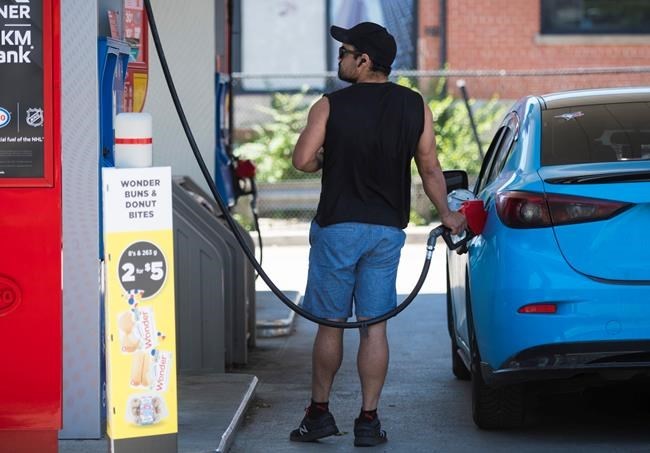
Canada’s inflation rate reached 8.1 per cent in June on a year-over-year basis as prices for most goods and services continued to rise. A commuter pumps gas into their vehicle at a Esso gas station in Toronto on Tuesday, June 15, 2021. THE CANADIAN PRESS/ Tijana Martin
Republished July 20, 2022 - 9:47 AM
Original Publication Date July 20, 2022 - 1:01 AM
OTTAWA - Economists are predicting Canada's inflation rate may have peaked in June as soaring gas prices pushed the cost of living up 8.1 per cent compared with a year ago, its hottest pace in nearly 40 years.
Statistics Canada said Wednesday the annual inflation rate for June was up from 7.7 per cent in May and marked the largest yearly change since January 1983 when it hit 8.2 per cent.
The increase in the consumer price index for the month was largely due to higher gasoline prices, which shot up by more than 50 per cent compared with a year ago.
Excluding gasoline, the country's inflation rate was 6.5 per cent in June compared with 6.3 per cent in May.
CIBC senior economist Karyne Charbonneau said the headline reading for inflation was lower than expected and called it the "first negative surprise on inflation in many months."
"With gasoline prices expected to fall next month, we could finally have seen peak inflation," Charbonneau said in an email.
According to retail analytics platform Kalibrate, gas prices have dropped from a peak of $2.14 per litre in mid-June to $1.88.
Douglas Porter, chief economist at the Bank of Montreal, said the June inflation reading was "better, but not good."
"There is likely to be some relief in next month's report, as gasoline prices are currently tracking roughly a nine per cent drop in July," he said in a report. "However, the concern is that other costs remain robust."
"While a pullback in pump prices could calm headline inflation next month, we will need to see core relent for inflation to truly peak."
RSM Canada economist Tu Nguyen said she thinks it's premature still to declare that Canada has reached the peak of inflation.
Nguyen said there are still many uncertainties when it comes to global pressures on inflation, including the war in Ukraine and an ongoing pandemic that could shut down manufacturing overseas in places like China.
In its latest monetary policy report, the Bank of Canada forecasted inflation will hover around eight per cent over the next few months before it begins to decline.
Last week, the Bank of Canada ratcheted its efforts against rising inflation when it raised its key interest rate by a full percentage point, bringing it to 2.5 per cent. It was the largest single increase since 1998.
Statistics Canada is scheduled to release its inflation report for July on Aug. 16 ahead of the Bank of Canada's next rate decision set for Sept. 7.
CIBC said the Bank of Canada will then be deciding between a half of a percentage point hike or a three quarters of a percentage point hike and will likely lean towards the latter. But, Charbonneau said the June inflation reading "may increase the chance they choose the small of the two steps."
Porter also predicted the Bank of Canada will hike its key interest rate by a half of a percentage point in its next decision.
However, Nguyen said she still expects the central bank to opt for another supersized rate hike in September.
"I think that we should expect another large rate hike in September, either 75 basis point or even as much as 100 points," she said. “And the reason for that is ... there's no question that prices are still rising up very, very quickly.”
In addition to high food and gas prices, Canadians experienced a surge in prices for travel-related services as public health restrictions eased and travel increased. Prices for accommodation rose by about 50 per cent across the country compared with a year ago.
"The return of sporting events, festivals and other large in-person gatherings has resulted in higher demand for accommodation, particularly in major urban centres," Statistics Canada said.
On a month-over-month basis, the consumer price index edged higher by 0.7 per cent, largely due to rising prices for gasoline and travel accommodations.
After declining slightly in May, air transportation costs rose 6.4 per cent month-over-month.
Canadians also continued to see higher food prices, with the cost of food up 8.8 per cent compared with June last year.
Among food items, the largest increase in prices was for edible fats and oils, which rose by 28.8 per cent year-over-year.
This report by The Canadian Press was first published July 20, 2022.
News from © The Canadian Press, 2022